Have you seen those enticing online ads promising free access to all your favorite TV channels with a device called TVMax TV antenna? It sounds too good to be true, doesn’t it? Well, as the old saying goes, if something seems too good to be true, it probably is.
In this comprehensive article, we’ll dive deep into the claims surrounding the heavily-promoted TVMax antenna and separate facts from fiction. Is this “revolutionary invention” really the cord-cutting solution of your dreams or just another overhyped scam preying on people’s desires to save money? Read on as we investigate the red flags, uncover the truth, and provide you with legitimate alternatives for affordable TV entertainment.
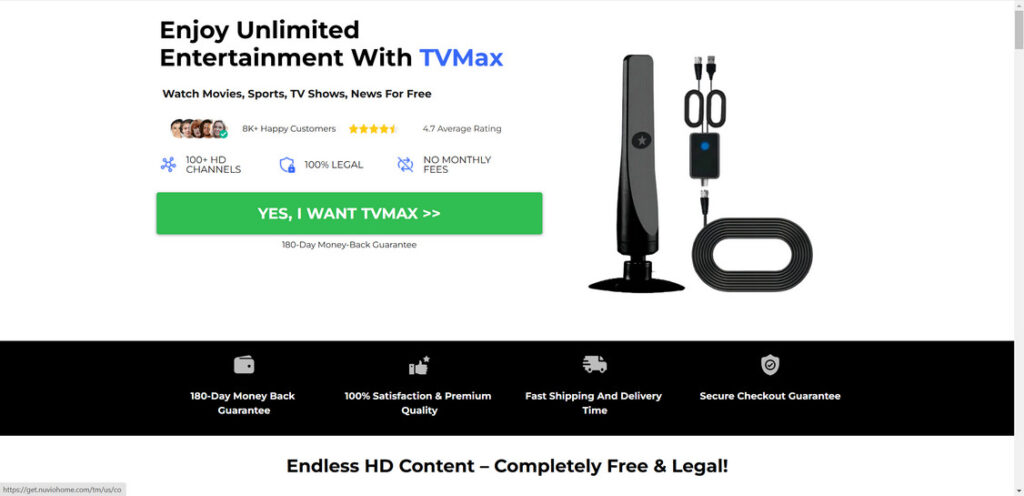
TVMax Antenna – Misleading Claims and False Advertising
The TVMax Antenna is a prime example of deceptive digital marketing designed to mislead and manipulate uninformed consumers.
This antenna is aggressively promoted all over social media and dubious websites using exaggerated claims and fake reviews. The goal is to trick users into purchasing an overpriced, basic digital antenna while believing they are getting an amazing deal.
Let’s analyze the misleading marketing tactics used to promote the TVMax antenna:
Outrageous Claims
The promotions for TVMax make wildly unrealistic assertions about the antenna’s capabilities, such as:
- Access over 100 free HD channels
- Developed with proprietary NASA technology
- Cancel expensive cable/satellite bills forever
- Crystal clear HD picture quality
- One-time payment only, no monthly fees
However, these claims are completely fabricated to hype up the product and create unrealistic expectations. The TVMax is simply a cheap, basic indoor HD antenna with very limited capabilities.
There is absolutely no truth to the claims of NASA technology, hundreds of free channels, cable-like HD quality or one-time fees. All clearly exaggerated to lure in victims.
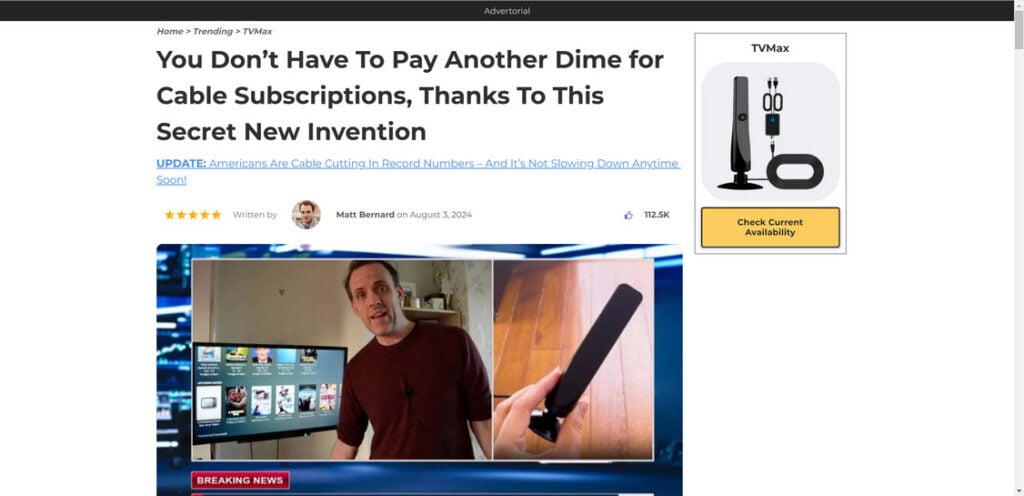
Fake Reviews and Testimonials
The promotional websites for TVMax contain pages and pages of fake reviews praising the product’s performance.
These include statements like “Picture quality better than cable!”, “My kids can watch all their favorite cartoons in HD” and “Bye bye expensive cable, I’m sticking with TVMax”.
The sites also feature supposed testimonials from happy customers with stock photos of smiling families. This is all an attempt to make the deception seem authentic through fake social proof.
In reality, all these reviews are completely made up. There are no genuine customers that got such an amazing experience from this basic antenna.
Deceptive Before/After Images
The TVMax ads also use deceptive before and after images to misrepresent the antenna’s capabilities.
The “BEFORE” images show a fuzzy, poor quality picture with a message like “Expensive cable bills”.
The “AFTER” images show a super sharp HD picture with a message “Crystal clear HD” implying this is the result of using the TVMax antenna.
This creates the illusion that the antenna can turn any TV into an ultra HD viewing experience. Which is simply not true – it’s only for manipulating uninformed consumers.
False Sense of Urgency
The sales pages use various tricks to create a false sense of urgency to purchase the TVMax immediately.
These include:
- Countdown timers saying the offer expires soon
- Claims of “limited supply” to make people afraid of missing out
- Only a certain number available per customer
- Flashing reminders like “Hurry, only 7 left!”
In reality, there is no reason to rush. This is done to trick people into purchasing quickly before properly researching the product and discovering the deception.
As you can see, the marketing for the TVMax antenna systematically uses exaggerated claims, fake reviews, deceptive images and high pressure sales tactics. All clever ploys to manipulate consumers into purchasing a cheap product at an inflated price under false pretenses.
TVMax has been also investigated by Jordan Liles on his YouTube channel, where he offers a detailed video on the subject. We recommend watching his content for a comprehensive understanding of the TVMax antenna device.
Next, let’s break down exactly what happens when you order this antenna.
How The Misleading TVMax Antenna System Works
The promoters of TVMax have developed an elaborate system focused on aggressive advertising and inflated pricing. Let’s examine step-by-step how this misleading scheme operates:
Step 1: Aggressive Social Media Marketing
TVMax relies heavily on YouTube ads, Google ads, and similar platforms to push their promotions and attract potential customers. The ads use enticing headlines like “Watch 1000+ Channels Free”, “End Cable Bills Forever”, and “Say Goodbye to Sky-High Monthly Fees”.
These attention-grabbing claims target users frustrated with expensive cable or satellite bills. When users click on the ads, they are directed to promotional pages and questionable review sites.

Step 2: Questionable Review Websites
These promotional websites are designed to resemble legitimate independent review platforms. They contain glowing reviews and testimonials praising the TVMax antenna. However, upon closer inspection, these reviews appear fabricated.
Stock photos of satisfied families are used to make the testimonials seem more authentic. In reality, the comments are likely crafted by the promoters themselves to mislead potential buyers.
Step 3: High-Pressure Sales Pages
When someone tries to order the TVMax antenna through these promotional websites, they are redirected to high-pressure sales pages. These pages employ persuasive tactics, including more testimonials, countdown timers, and limited-time offers to convince visitors to make a purchase before fully researching the product.
The sense of urgency created by these pages is designed to rush customers into buying, leaving little time to scrutinize the legitimacy of the claims.
Step 4: Bundling and Upselling
To maximize profits, TVMax’s promoters often bundle multiple units of the antenna together and sell each bundle at a significantly marked-up price. For example, they may offer a bundle of 3 antennas for $90, even though the manufacturing cost per unit may be much lower.
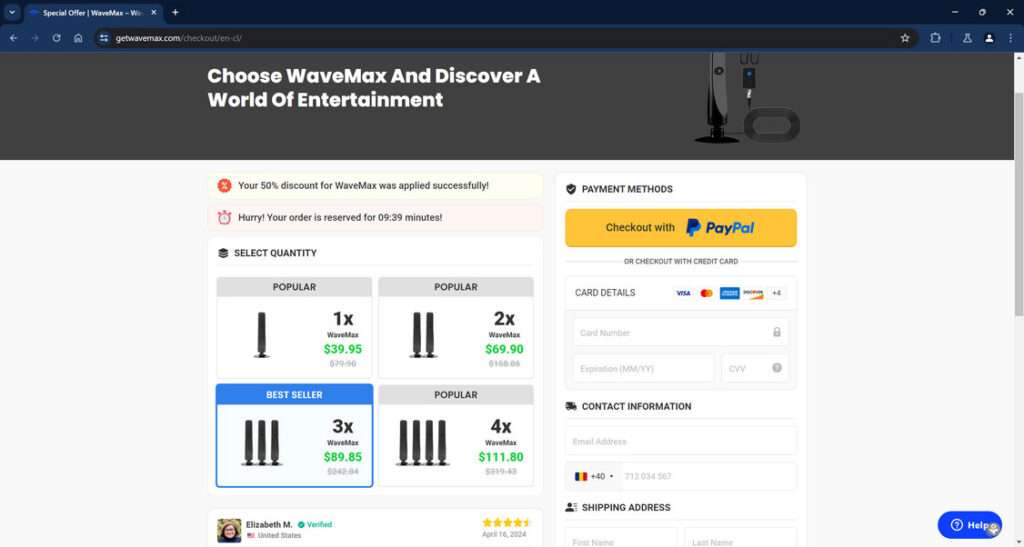
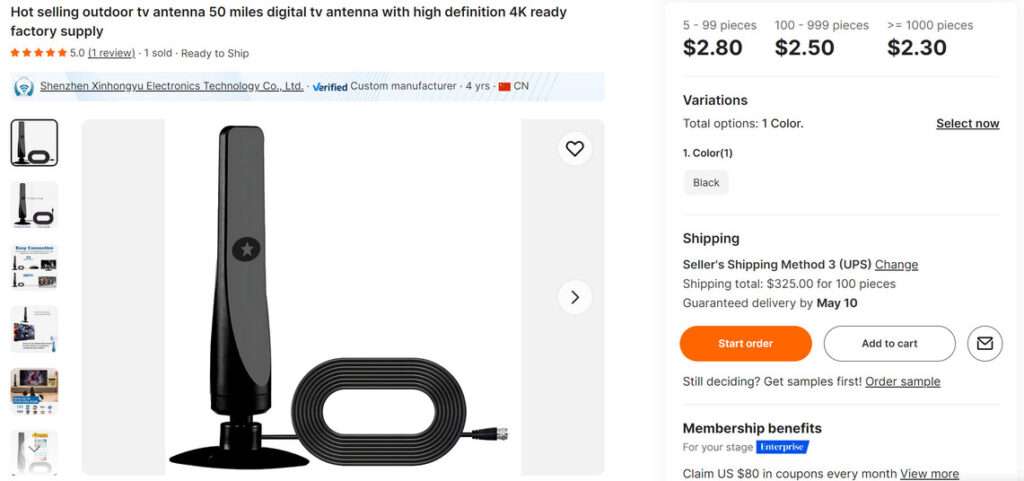
The sales pages also employ upselling techniques, using scarcity tactics and alleged discounts to pressure customers into buying more units than they initially intended. This strategic bundling and upselling further inflates the promoter’s profit margins.
Step 5: Difficult Return Process
Once consumers purchase the TVMax antenna at the inflated prices, obtaining a refund or return can be intentionally complicated. The fine print on the website often contains restrictive terms, such as allowing returns only within a narrow 14 or 30-day window.
Moreover, the company may deduct substantial fees for return shipping, further discouraging customers from attempting to get their money back. These policies ensure that dissatisfied buyers face significant hurdles in getting a refund, allowing the promoters to profit from their misleading tactics.
The TVMax TV antenna system relies on a combination of aggressive advertising, misleading claims, high-pressure sales tactics, and restrictive return policies. By creating a sense of urgency and limiting consumers’ ability to easily obtain refunds, the promoters can generate significant profits while leaving many customers disappointed with their purchases.
What You’re Likely Getting with TVMax
Based on research into similar products and antenna technology, purchasing the TVMax antenna will likely get you:
A Basic HD Antenna
Underneath the hype, TVMax appears to just be a standard HDTV antenna, similar to those available from many electronics retailers. These antennas can pick up over-the-air HD broadcasts from local network affiliates, but not much beyond that. Claims of “secret codes” and cable channel access are just false advertising.
Limited Channel Selection
A typical HD antenna provides access to free broadcast channels like the major networks, public television, some religious programming, home shopping channels, and a few other limited offerings. Premium, cable-only, and streaming channels will not be available as those require a paid subscription separate from any antenna.
Potentially Low Quality
Many “as seen on TV” type products like TVMax come with questionable build quality. Even if it functions as a basic antenna, it may not be the most durable or long-lasting option. Antennas from established electronics brands are often a safer investment.
While TVMax may not be an outright scam in the sense that you’ll likely receive a physical product, it is undoubtedly engaged in extremely misleading and unethical marketing. The claims about “secret codes” and free access to premium cable content are blatantly false. The creator story is unverified and the “customer reviews” are fabricated.
At best, TVMax seems to be a rebranded generic antenna sold at an inflated price through false promises. At worst, it’s an intentional scam preying on people’s desires to save money on TV entertainment.
Buyer Beware: TVMax Sold Under Other Names
One concerning issue to note is that the TVMax antenna appears to be sold under various different names, utilizing similar marketing tactics on each website.
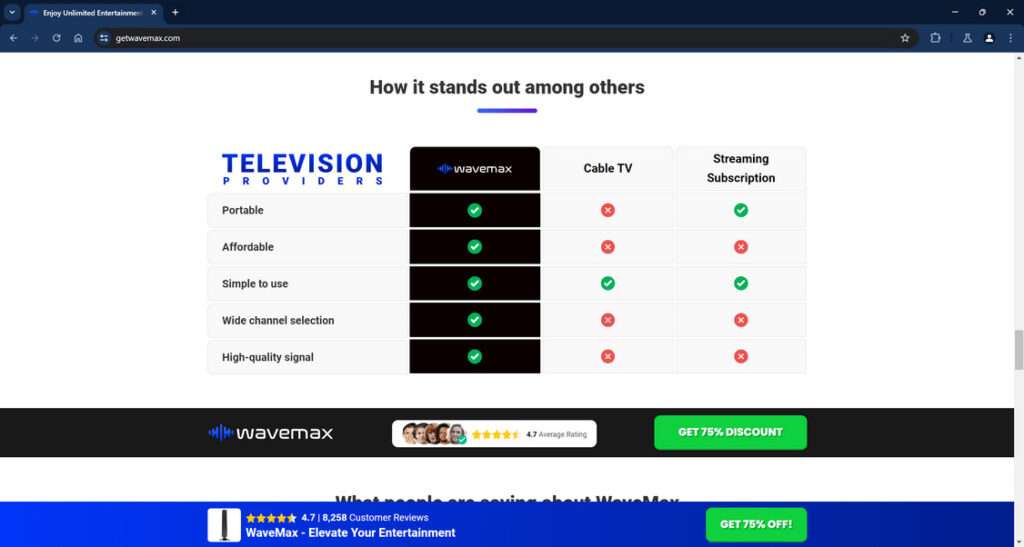
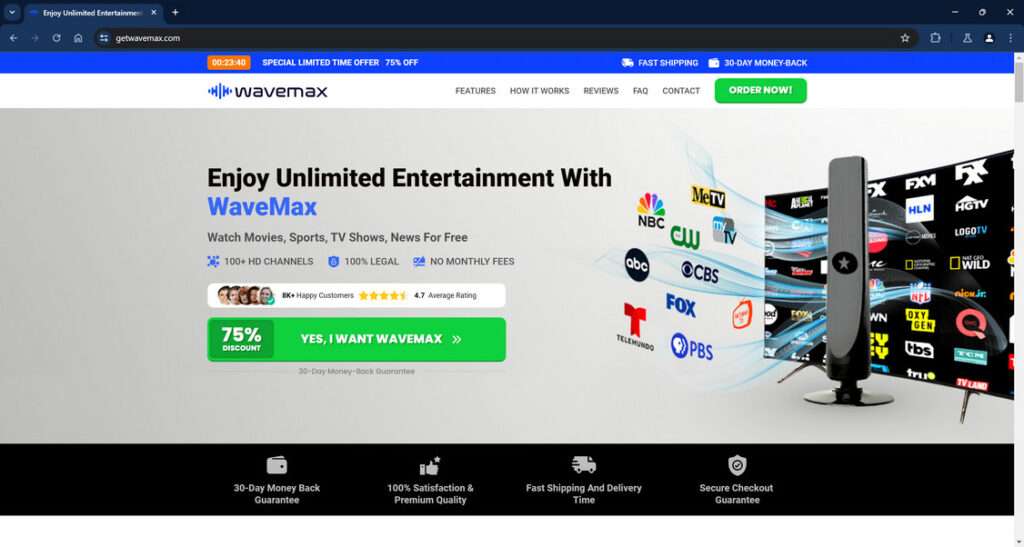
These include:
- UltraLink TV Antenna
- WaveMax TV Antenna
- TVBoost Antenna
All these products have websites that look nearly identical to TVMax, typically with:
- Similar claims of 120 mile range and free unlimited channels
- Fake-looking reviews and testimonials
- A “50% off” discount
- Special offers like buy 2 get 1 free
It seems that the same company is operating each of these antennas under different names and duplicating the same dubious sales practices.
The fact that TVMax pops up under so many aliases raises even more red flags about the legitimacy of the product and the company behind it.
Consumers would be wise to thoroughly research any TV antenna with outsized claims and deep discounts before purchasing. And be especially wary if the antenna name changes while the website stays the same.
What to do if you you bought TVMax:
If you have already ordered the TVMax antenna and realized the advertising was misleading or you are not happy with it, here are some steps you can take:
- Call your credit card company: Contact your credit card provider immediately and request to chargeback the transaction as fraudulent. Provide details of the deceptive marketing and false claims.
- Report the seller: File a scam and fraud report with the FBI Internet Crime Complaint Center (IC3). Also notify the FTC and BBB to help warn others.
- Leave online reviews: Post detailed reviews about the misleading advertising on consumer complaint sites like Trustpilot and Scamadviser. This helps warn other users from being deceived.
- Request a refund: Send a refund request in writing through email and certified mail. Detail how the product is not as advertised. If they refuse, file a dispute.
- Do a chargeback: If the seller refuses to refund, do a chargeback with your credit card company for services not rendered as advertised. Provide evidence of scam and product not matching claims.
- Warn your contacts: Let your family and friends know about this scam in case they have seen the ads. Share this article to help prevent others from falling for it.
Frequently Asked Questions About the TVMax TV Antenna Scam
1. What exactly is the TVMax TV Antenna?
The TVMax is marketed as a special digital HD antenna that can pick up over 100 channels for free without cable. However, it is simply a cheap, low quality antenna sold at an inflated price.
2. Does the TVMax really use secret NASA technology?
No. Claims that TVMax uses proprietary NASA tech or was designed by NASA engineers are completely false. This is a marketing gimmick intended to mislead consumers.
3. Can the TVMax actually replace cable TV?
Absolutely not. The TVMax can only pick up a limited number of free over-the-air local channels. It cannot provide anywhere close to the same amount or variety of channels that paid cable TV or streaming services offer.
4. How many channels can I really get with the TVMax antenna?
In most locations, you can expect to get between 10-30 channels with the TVMax if you are within range of TV broadcast towers. The number of channels depends on your distance from the towers and any geographic obstacles.
5. Does the TVMax provide HD quality channels?
The picture quality will vary depending on your location. While some major local channels may be in HD if you are close to the towers, most channels will be lower quality, especially if farther away.
6. Can I cancel cable and switch to the TVMax to save money?
Canceling cable for the TVMax is not recommended, as you will lose access to the vast majority of cable channels and shows. At best, the TVMax can supplement but not replace cable TV.
7. Is the advertising and marketing for TVMax truthful?
Mostly false. The deceptive marketing uses manipulated images, fake reviews and other misleading tactics. Their claims are greatly exaggerated and do not represent real-world performance.
8. Where is the TVMax TV Antenna really manufactured?
It is a cheap generic antenna manufactured in China and sold on sites like Alibaba for $2-5 per unit.
The Bottom Line
The TVMax Antenna uses deceptive marketing and inflated pricing to trick consumers out of their hard earned money. Their claims of free HD channels and cable-beating performance are simply false.
At best, the TVMax is just a cheap digital antenna that can pick up a limited number of free over-the-air channels. It is not some special NASA-designed product.
There are similar antennas available at local retail stores for under $20. Do not be tricked into buying this overpriced scam product. We recommend avoiding all products marketed in this deceptive manner for your own benefit.
Stay vigilant and warn others about the TVMax scam. Share this detailed exposé to prevent more people from being manipulated by the false advertising.
This article is for educational purposes only and does not constitute professional, financial or legal advice. The content is intended for general information and should not be construed as definitive guidance. Information contained herein is subject to change without notice. For concerns, please contact us via the provided form.
If you are the owner of the website or product in question and wish to offer clarifications regarding your business or website, please reach out to us through the provided Contact Form.



